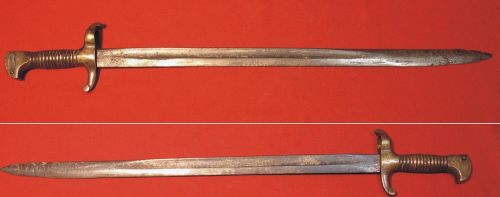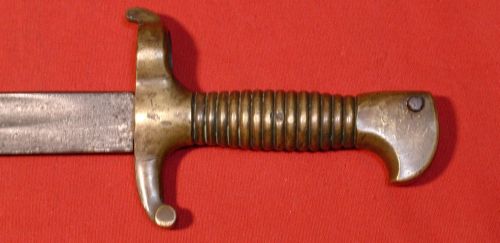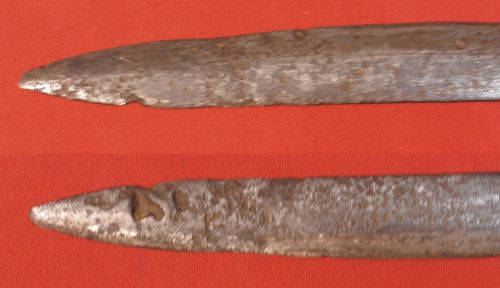If I’m not killed in the charge, then this damned heat will surely do the deed for me, Louis thought grimly as he absentmindedly rubbed the barrel and the blade of his bayonet with a dirty rag. He could feel sweat beginning to rise up and drip off his body underneath his starchy wool uniform. He picked at the material delicately with his thumb and finger as if he could simply pluck away at his discomfort.
Trying to ignore the unbearable July heat, he leaned forward, standing on his toes, to look at the other men grouped together in a thick, uneven line. Several days of marching in the awful conditions had made their mark on the men; they were exhausted, their frame slumped, their hair damp with sweat. Their faces were peppered with new beard, and the very faint stench of sweat and urine was slowly wafting into Louis’ nostrils. The soldiers spoke little to each other, either from anxiety or exhaustion or both, shifting on their feet, some constantly adjusting the positions of their guns. On the shoulder, then on the stock by the feet, then across the chest, as if they were preparing to pose for a photographer who was going to capture their bravery and intimidating stance on a piece of paper, which would be framed and hung on a wall in the soldier’s home, where all would stand around and gaze upon that image of courage and power. Louis twisted his mouth in an amused smile to himself at the thought.
He could not see any familiar faces, except for one here and there which he thought he might have seen about town, such as a shopkeeper or an ironsmith. His very close friend Thomas was nowhere to be seen. His heart sank as he remembered trying to find him before he went off to war. Upon arriving at his house to bid him farewell, Louis had discovered Thomas' residence to be empty. Saddened, he could do nothing and had left for the fighting without him.
Before the war, Louis and Thomas visited each other very often, played checkers or went out into the fields to shoot crows or fish in the nearby pond, like two little schoolboys. Thomas was a good man with a large heart. He was much loved by the citizens of the tiny town of Clearbrooke, and was mostly known for his excellent sense of humor and his taste for adventure and excitement.
Louis sighed and rubbed his face, knowing he would miss Thomas’ good jokes and ever-present smile there beside him to cheer him up during the fighting.
Sighing, Louis glanced with mild interest to the left and right sides of the hilly field scattered with white-barked trees. He squinted and could see several ladies in hoop skirts delicately seating themselves on a quilt spread out on the grass by their beaus and husbands. One by one they settled themselves and opened picnic baskets to enjoy a lunch while they watched the charge. A few misbehaving children played and waded in the banks of muddy Bull Run, dirtying their clothes and delighting in displaying them to their parents.
He turned his head at the sound of snorting and the muffled clip-clopping of horse’s hooves in the dirt and saw General McDowell, flanked by two other men, riding past the line with sword in hand. Louis could feel the line of soldiers stiffen up and breathe deeply in preparation for what was to come.
McDowell gestured with the sword, his wrist flopping a little under the weight of steel and gold, motioning through the thin trees and over the hills. He briefly went over once more how they were to attack, his mustache bouncing up and down as he spoke, but, rather than infuse confidence in his men, he seemed to cause a stir of unease in the air that followed him as he rode back down the line. McDowell was going to split up the divisions and attack to the northwest flank. The men around him nodded their heads slightly in final understanding, but Louis could still feel the uncertainty and nervousness hovering over him like a cloud of locusts.
The general weaved his way down to the far left side of the troops, where Louis could barely hear him; perhaps the humidity had stifled his voice in the air before it could reach his ears.
He held up his rifle with both hands with the other men. The crisp sound of hammers being pulled back in unison broke the stuffy silence around them. Louis picked up and dropped his feet a little to stimulate his stiff legs, wiped the sweat from his forehead and stood on his toes again to wait for the order to move out. McDowell made an upward sweeping motion with his sword and immediately the large line of men started forward at a quick pace, bringing up small clouds of hot dust with their feet. Louis could see the capped heads in front of him bouncing up and down slightly in a loose rhythm, like a mass of cows being herded towards the slaughterhouse.
The men flanking McDowell shouted, and the divisions split, heading in different directions at once, guided by commanders on horseback. The soldiers then broke into a run, their excitement mounting, their hands clutched around their guns as they began to crest the first hill, running around the white-barked trees and wading quickly through the small streams, gradually breaking up and spreading out like a pack of lions, running faster and faster, and Louis could hear panting and thumping boots…
All of a sudden there were great shouts and cries, loud explosions and puffs of gun smoke, thuds and cracks. Louis’s ears were filled with noise and his heart hammered against his chest as he raised his rifle and ran low to the ground, firing at pairs of legs clad in gray uniform.
He didn’t stop to see if he had downed any of his targets; he kept running, ducking, firing at the Southerners through the smoke and the heat, panting and feverishly reloading his gun behind trees. A mixture of horror and excitement flowed through his veins; his heart roared in his ears.
He could hear men falling around him from both sides. One of his fellow soldiers beside him was shot out from under his feet when a bullet struck him in the chest, landing him on his back where he didn’t get up. Another man in front of Louis took a bullet to the head. Louis narrowly avoided tripping over his body sprawled across the ground. Moans and cries rose up all about him as he passed downed men lying in the soil, bleeding to death, screaming in horror as they discovered missing limbs, ears, fingers, eyes.
When he ran deeper into the woods, he met far more rebels. The place swarmed with them. They met McDowell’s men with a clash of noise; gunfire, screams and shouts, heavy thuds and thumps, grunts and gasps. A bullet ripped into Louis’ arm but he only stumbled and groaned, continuing to fire wildly at any rebel he could make out in the haze even as he felt warm sticky blood soaking the sleeve of his jacket.
When Louis was empty of bullets he held his gun by the barrel and swung it like a club back and forth and thrust with it, knocking out a path through the relentless river of men coming at him. More than once he got a gunstock in the face and his lip and nose began to bleed, but his mind and eyes were still clear and he went on. He spotted a dead rebel on the ground, bent down, snatched up the revolver still in his lifeless hand and began to fire again. Don’t stop to think. Don’t stop to look.
To Louis’ shock, the steadily thinning rebel troops suddenly swelled and roared, charging with renewed vigor. Hundreds of Southerners flooded into the woods with war cries, flattening a row of McDowell’s men at once and trampling right over the bodies.
Louis veered away from his division up into the thicker woods, where he crouched behind a tree and watched from above, panting, his wounded arm throbbing.
It was as if rebels had been dumped out from the sky; there were so many of them that the ground seemed to teem and squirm with gray. Louis could only stand there and watch in dismay as his fellow soldiers either fled from the advancing rebel troops or were shot where they stood.
Anger steadily rose in Louis’ heart at the sight of his comrades being struck down before him. He found he had only two bullets left in the revolver. Taking two rebels down would be better than taking none. He stood up from behind the tree and, leaning out a little to the side, fired twice at two different men. Both of them fell, but unfortunately the rebels grouped around the fallen men looked up and must have seen Louis standing there, for they raised their rifles and fired at him.
A bullet passed through his calf and another whistled past his ear. He fell and hollered in pain. The rebels below obviously believed they had killed him, because they ran off without firing at him again. Louis gritted his teeth against the excruciating pain and crawled up the embankment behind some brush to examine his injury. He probed the bloody wound in his leg with his fingers and, thank God, could feel no lead. He tore off the hem of his jacket and tied it tightly around the bullet hole, trying to keep his mind firmly off the pain. The fabric would soak up most of the blood and hopefully enable him to keep fighting.
He struggled to his feet, using his rifle as a sort of crutch, and surveyed the scene below him. The rebel troops appeared to have moved onward leaving a trail of dead men in their wake, and it seemed safe for Louis to continue on. He limped like a lame dog down the hill, using the thin trees for some cover, and crawled up another gentle hill again until he came to Bull Run. He stood in it and let the muddy water wash his blood away before he staggered on.
When he mounted yet another hill and leaned on his gun to rest, he saw an awful, sickening sight laid out before him. The air hung thick with smoke and gunfire, but nevertheless, Louis could clearly see hundreds of dead Union soldiers lying on the ground and thousands of rebels swarming everywhere, swords swinging and guns blasting. The faint smell of blood and bile hung in the air along with the smoke, causing Louis’ breakfast of hardtack and warm milk to churn horribly in his stomach.
He slowly made his way down the hill to join in the fight, briefly bending down to take another pistol from a dead man on the ground, and advanced towards the rebels, firing into them. He saw many expired soldiers lying on the ground, either shot through the head or the heart or impaled by a bayonet, and he even saw one man reduced to nothing more than a pile, having been struck in the abdomen by a large cannonball.
Louis was beginning to think no one had seen him enter the battle, when all of a sudden he was knocked over by a hard blow to the head and landed face first into the dirt. He rolled over to see a rebel swinging his gun up and bringing it back down on his face with all his might, breaking Louis’ nose and blacking his eye. In a completely automatic reaction, Louis raised his bayonet, blade up, to defend himself. He felt the knife enter his attacker’s belly, but even so the man swung his gun once more and knocked Louis out cold.
* * *
When he finally came to, Louis found he was looking up at a pink sky painted with orange and red streaks of cloud. Hidden behind them, stars were beginning to twinkle at him, waking up to prepare for the night, and for one brief moment, Louis marveled at how beautiful the universe was.
He raised his sore head, groaning. His face was swollen. There was a stabbing pain in his leg and arm where he had been shot and he couldn’t move a muscle without moaning in agony.
Louis lifted his upper body with his arms as best he could. He stared around and blinked through swollen eyelids, trying to clear the vision. He had to get his bearings if he was to get back home.
When he raised his head, the sight and smells that met his senses made his stomach clench. Dead men lay everywhere around him as far as he could see. Masses of dark lumps on the ground, white faces staring up at the sky, the stench of dirt soaked in blood. Louis rolled over on his side and heaved his poor excuse for a breakfast onto the ground.
When he’d gathered himself, Louis lay down again on his back, turned his head to the side and saw a dead rebel lying on the ground close by, impaled by a bayonet. His head was slightly twisted to the side, away from Louis, and his arms were clumsily draped across his stomach. A crooked circle of drying blood had soaked through his uniform around the blade of the bayonet.
It was then Louis remembered stabbing the man who had been beating him, and he shuffled forward a little to retrieve his weapon in the man’s belly. When he reached out to grasp the barrel, he could not keep his eyes from traveling to the dead soldier’s pale face.
The impaled man was his friend, Thomas.
Louis stared in icy disbelief at his friend lying there on the ground. Thomas was wearing a gray rebel uniform. His cap had fallen off, revealing his sandy blond hair, and his dead hands were wrapped loosely around the bayonet, as if he had been trying to pull it out of his stomach in one last desperate attempt to live. His horribly white face was frozen in a look of shock, his blue eyes half-closed and his lips and teeth stained with dark blood.
“What do you say, Louis…let’s go shoot crows in Mr. Harvey’s old field…come on, what do you say...”
A cold, paralyzing horror squeezed Louis’ heart with its iron hand…he had killed his own friend, the very man he had hoped to find fighting beside him; a comrade in battle. He had wanted to hear his jokes, to feel him slap him on the back and laugh with him, to grab his hand and pull him out of danger, to console him when he missed his family. He had hoped to triumph together or die together, but when he could not find him, he concluded that his friend had not been enlisted and was away…but he had been here all along, as a Southerner, and now he was dead, run through by his friend’s own two hands…
“Oh, God,” Louis gasped. He wrapped his arm about himself and squeezed his ribcage. Tears coursed through the blood and dirt on his face, and his wounded body heaved with every rattling breath. He leaned down, his good arm shaking as it supported his weight, and he hugged Thomas, lifting him up with his bleeding arm. He buried his face in his neck, smelling sweat and dirt, and cradled his head gently with his own hand, sobbing deeply into the matted hair.
“I’m sorry…”








 I see there are two tikes near the river, but this same picture is similar to others I've seen – there is not real coverage, hardly if that.
I see there are two tikes near the river, but this same picture is similar to others I've seen – there is not real coverage, hardly if that. 


Gender:
Points: 890
Reviews: 61